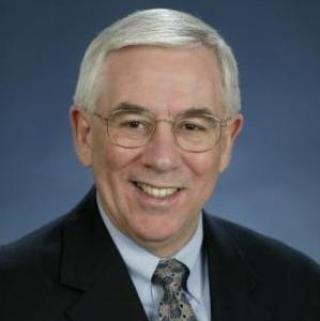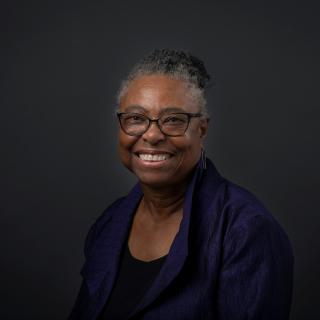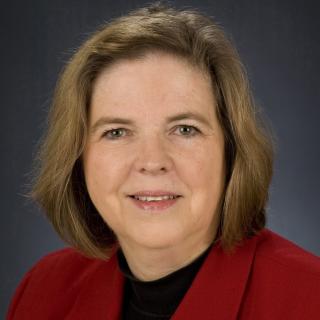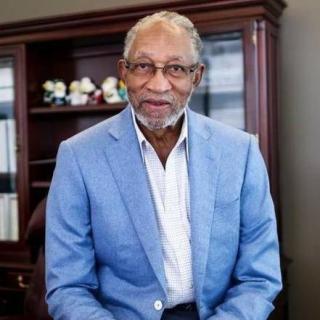
The Distinguished Service Award was established by the Board of Trustees in 1952 to recognize individuals who have rendered exceptional service to the university. Awards are not made on the basis of long, faithful, or loyal service alone, but rather for service that is truly distinguished. Recipients of this award have provided a broad spectrum of services to the university in both official and unofficial capacities.
Past Award Recipients

Paul A. Beck
Few scholars understand the trends and data related to voting behavior, political parties and public opinion better than Dr. Paul A. Beck.
Dr. Beck is emeritus professor and academy professor of political science at Ohio State and co-coordinator of the Comparative National Election Project (CNEP) (u.osu.edu/cnep). Founded in the late 1980s, CNEP has conducted more than 60 election surveys in 30 countries, including the U.S. in 2020 and Brazil in 2022.
Before retiring in 2012, Dr. Beck served as Distinguished Professor of Social and Behavioral Science and professor of political science, with courtesy professor appointments in the School of Communication and Department of Sociology at Ohio State. He chaired the Department of Political Science from 1991 to 2004 and was dean of the College of Social and Behavioral Sciences from 2004 to 2008.
After graduating with honors from Indiana University in 1966, Dr. Beck earned a PhD from the University of Michigan in 1971. He worked at the University of Pittsburgh and Florida State University before joining the Ohio State faculty as professor of political science in 1987, becoming co-coordinator of CNEP in 1989. In the years since, Dr. Beck has become one of the most sought-after and frequently cited experts on elections and democracies.
Over the course his career, Dr. Beck has published nine books and numerous articles in leading professional journals on voting behavior, political parties and public opinion; has received five research grants from the National Science Foundation; and has been a frequent commentator on politics in the media and before community and professional groups. He has also served as a vital mentor to countless students, earning teaching and service honors as well as chairing dozens of PhD dissertations and honors theses.
He is recipient of Ohio State’s Distinguished Scholar Award and the American Political Science Association’s awards for distinguished service to the profession and lifetime professional contributions to the field of political organizations and parties.

Ruth D. Peterson
Dr. Ruth D. Peterson rose from a childhood in rural Georgia during the height of the Jim Crow era to the very pinnacle of academia, establishing herself as one of the nation’s leading experts in criminology and sociology.
She has demonstrated a strong and continuous commitment to serving her community and her students — expanding access to high-quality education at every turn. Recognizing the key role that a strong support network played in her own success, Dr. Peterson has empowered and supported young people throughout her career.
After graduating high school with honors, Dr. Peterson followed the path of so many others who joined the “Great Migration” and boarded a bus to Cleveland.She graduated from Cuyahoga Community College before enrolling at Cleveland State University, where she studied sociology. Upon graduation in 1969, she accepted a position as a professional assistant at Cuyahoga Community College, the first step in what would become an illustrious career.
After receiving a PhD from the University of Wisconsin, she served as a professor at the University of Iowa and then joined the faculty of The Ohio State University in 1985. At Ohio State, she focused her academic research on the impact of racial and ethnic inequality on community conditions, crime and criminal justice policies.
Dr. Peterson served as director of Ohio State’s Criminal Justice Research Center from 1999 to 2011, helping to build it into a national leader of academic research into the causes of crime and the impact of justice policies. As a signature feature of the center’s activities, she established the Racial Democracy, Crime and Justice Network and an associated Summer Research Institute to mentor and support young, underrepresented scholars in their pursuit of academic success. With support from the National Science Foundation, these programs continue to this day and have successfully assisted scores of young scholars who otherwise might not have received sufficient mentoring to succeed in academia. Also, Dr. Peterson has served as president of the American Society of Criminology (ASC) and is a recipient of its Edwin H. Sutherland Award, which recognizes outstanding contributions to theory or research in criminology on the etiology of criminal and deviant behavior, the criminal justice system, corrections, law or justice.
Additionally, the ASC established the Ruth D. Peterson Fellowship for Racial and Ethnic Diversity, which is designed to encourage students of color — especially those from racial and ethnic groups underrepresented in the field — to study criminology and criminal justice, and to facilitate the completion of their degrees.
Dr. Peterson is a co-author of the book Divergent Social Worlds: Neighborhood Crime and the Racial-Spatial Divide (2010) and a co-editor of The Many Colors of Crime (2006).

Kara J. Trott
When Ms. Kara J. Trott established Quantum Health in 1999, she didn’t just start a company, she launched a movement. Ms. Trott was at the vanguard of a new industry that today helps millions of Americans navigate employee-based health coverage.
Today, she serves as founder and board chair of Quantum Health, a first-of-its-kind consumer care coordination and navigation company, to address the growing complexity of health care with the belief that no one should have to navigate this increasingly confusing and daunting system alone.
Under her leadership, Quantum Health built care coordination and navigation models based on how people experience health care. Today, it serves over 2 million members at hundreds of employers across the United States.
Ms. Trott has earned numerous awards for her innovation and leadership, including Columbus CEO’s Healthcare Executive of the Year, Columbus Business First’s Executive of the Year and Ernst & Young’s Regional Entrepreneur of the Year. In 2022, Modern Healthcare named her among the Top Women Leaders in Healthcare.
In 2021, Ms. Trott turned over management of Quantum Health so she could focus on efforts in the broader business, academic and philanthropic communities. She is a member of the Tiffany Circle Society of American Red Cross, the Women Presidents’ Organization, the Governing Board of Make-A-Wish (Ohio, Indiana, Kentucky region) and the Advisory Board of the Ohio Healthcare Businesswomen’s Association.
Ms. Trott serves on the Board of Trustees of Ohio Wesleyan University, where she earned a bachelor’s degree in politics and philosophy. She also a member of the President’s Club Advisory Board at Ohio State and the National Council for Moritz College of Law, where she earned a JD.

Caroline C. Whitacre
A distinguished educator, scientist, community leader and volunteer, Dr. Caroline C. Whitacre has demonstrated selfless commitment to helping advance science through research. She is a consummate example of the university’s core mission to create, discover and share knowledge that improves the well-being of local, state, regional, national and global communities.
Considered one of the world’s most acknowledged authorities on autoimmune diseases, Dr. Whitacre’s research has made significant contributions toward understanding and treating multiple sclerosis. She has received research support from the National Institutes of Health, Health Resources and Services Administration, and the National Multiple Sclerosis Society.
As senior vice president for research at Ohio State, Dr. Whitacre oversaw a more than $900 million annual research program. Prior to assuming that role, she served as vice president for research, associate vice president for health sciences research, vice dean for research in the College of Medicine, and director of the School of Biomedical Science.
Additionally, she is an emeritus professor and former chair of the Department of Molecular Virology, Immunology and Medical Genetics. She joined the Ohio State faculty in 1981.
During her tenure at Ohio State, Dr. Whitacre received a Faculty Award for Distinguished University Service and recognition as a University Distinguished Scholar. A Buckeye herself, Whitacre received her BA and PhD degrees at Ohio State and completed her postdoctoral training in immunology at Northwestern University Feinberg School of Medicine.
Among her numerous accolades, Dr. Whitacre is a Fellow of the American Association for the Advancement of Science and is a member of the National Academy of Inventors. In 2009, she was inducted into the National Multiple Sclerosis Society Volunteer Hall of Fame for Researchers and received the Lifetime Achievement Award from the National MS Society in 2019. She has chaired various task forces for the society and currently chairs the Scientific Advisory Committee, working toward the society’s mission of curing MS and empowering people with MS to live their best lives.
Since her retirement from Ohio State, Dr. Whitacre — a wife and mother of one grown son — has continued to serve her community. She is currently the village administrator in her hometown of Morrow, Ohio. In this role, she addresses infrastructure needs and leads the effort to submit grants and carry out projects for the advancement of Morrow.

Robert L. Wright, Jr.
Dr. Robert L. Wright Jr.’s broad portfolio of personal and professional successes — realized despite significant societal challenges — defies easy characterization.
He began his journey at Ohio State, where in 1960 he became just the second African American to graduate as a Doctor of Optometry. Today, Dr. Wright is widely regarded as one of the most highly respected business leaders of his generation. He has spent more than 60 years working in government, business and finance to accelerate the health and happiness of and economic justice for Black and minority populations.
Recognizing a significant lack of services and representation in local politics for people of color and regarding issues of concern to them, Dr. Wright launched a consulting firm devoted to race relations, research, minority affairs and public policy in 1974. He put cutting-edge technology to use, developing computerized fundraising programs and a polling system.
In 1985, Dr. Wright founded Dimensions International, Inc. (DI), a provider of technology solutions to both the public and private sectors. Starting with only three employees, he built the company into a world-class organization with more than 100 offices in 10 countries and staff of more than 1,500 individuals. DI was purchased by Honeywell in 2007.
A dedicated public servant and community leader, Dr. Wright also served three consecutive terms on the city council of Columbus, Georgia — developing and supporting legislation related to housing, recreation, employment, industrial development, and street and highway improvements. In 1982, he was appointed by President Ronald Reagan to the position of associate administrator for minority small business at the U.S. Small Business Administration.
Over the course of many years, Dr. Wright has stayed close to his alma mater. He has provided generous support for scholarships, as well as shared both his time and remarkable life experiences with Ohio State students.
A recipient of the 2014 Congressional Black Caucus Foundation Phoenix Award, Dr. Wright is a former chairman of the Presidential Commission for the National Museum of African American History and Culture and a member of the Horatio Alger Association Board of Directors. He has served as a member of The Ohio State University Alumni Advisory Council, the Board of Directors of Aflac, the Board of Trustees for Morehouse School of Medicine, and the Executive Leadership Cabinet for the Martin Luther King Jr. National Memorial Project Foundation.


